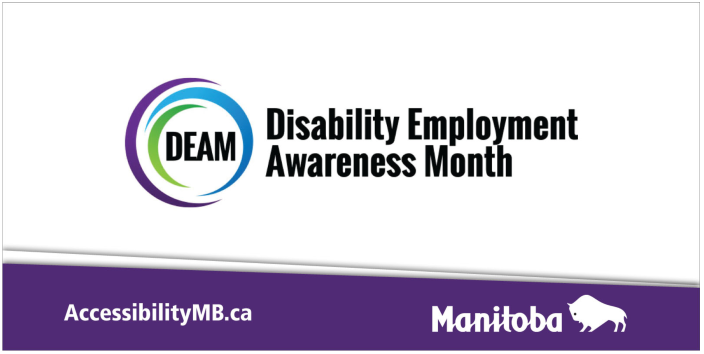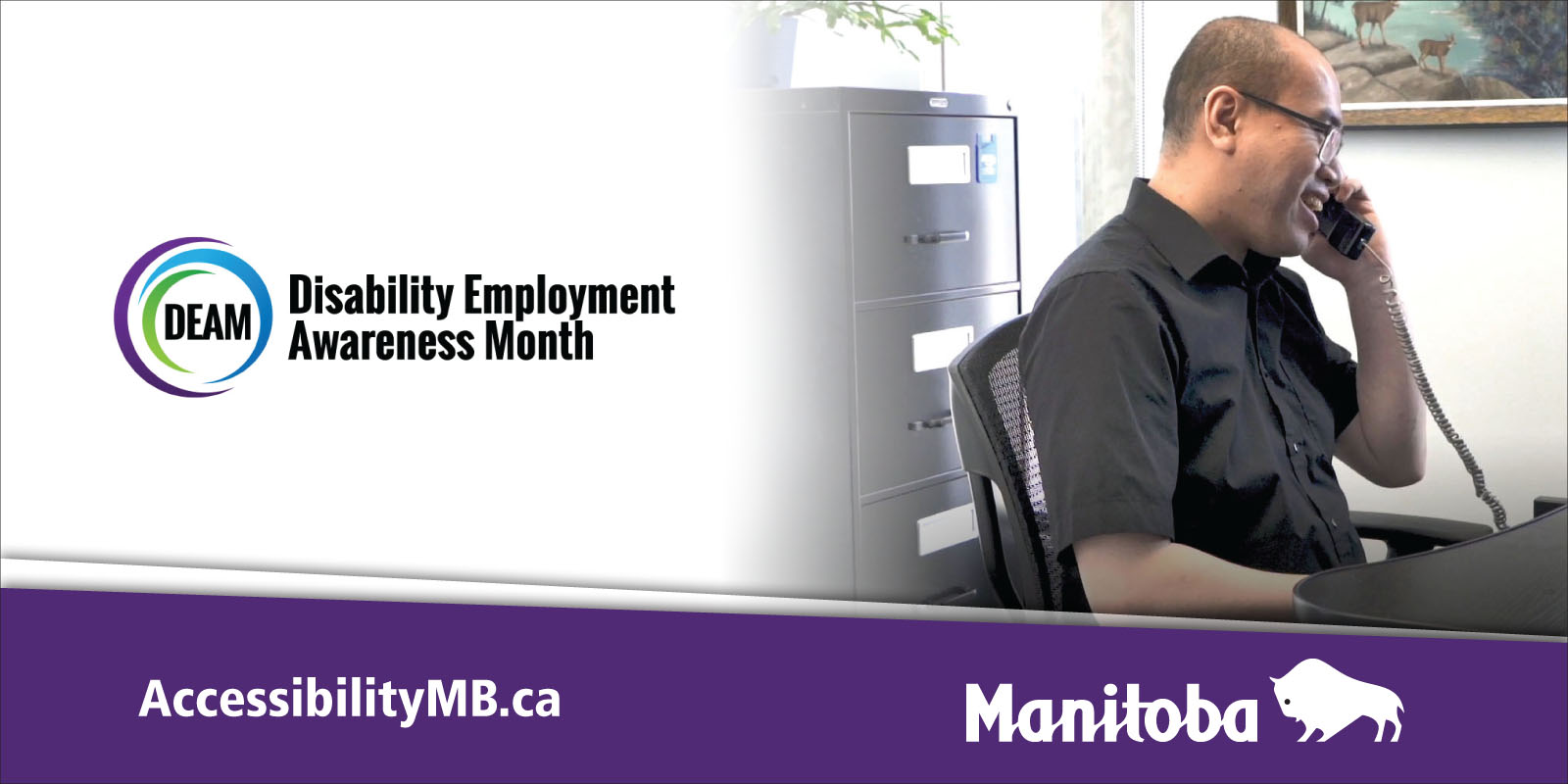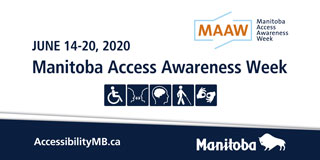Issue 15 | October 2020

Disability Employment Awareness Month (DEAM) 2020
Since 2012, the Manitoba government proclaims Disability Employment Awareness Month (DEAM) annually in October to encourage the hiring and inclusion of people with disabilities. The goal is to celebrate the contributions of individuals with disabilities to workplaces and communities and to promote the employment of individuals with disabilities to create a better, more inclusive Manitoba.
This is the first year that the Disabilities Issues Office is celebrating DEAM by co-hosting an online webinar with Manitoba Employment Equity Practitioners Association (MEEPA) and Manitoba Possible. We are excited about this new opportunity to encourage inclusive employment.
Learn more by visiting AccessibilityMB.ca!
The Future of Work: Accessible & Inclusive Employment During COVID-19 & Beyond
Free Webinar October 29th from 2 to 3 p.m. CDT.
You will learn about:
- The importance of accessible & inclusive employment
- Universal trends affecting the future of work and the impact on people with disabilities, including during COVID-19
- Best practices in accessibility for businesses and organizations during COVID-19
Featuring keynote speaker:
- Shane Kanady, Vice President Workforce Development, SourceAmerica & Portulans Institute Fellow
Register for the webinar at: deam2020.eventbrite.ca
For more information about DEAM and featured activities, please visit: AccessibilityMB.ca.

DEAM Online Activities
Join the #DEAM2020 conversation on social media - download the toolkit
To help promote DEAM and increase your social media engagement, download the DEAM Social Media Toolkit. It includes ready-to-use text and images relevant to community allies, including individuals, businesses and organizations.
- Share the toolkit and content with others on social media.
- Share personal stories of accessibility and inclusion on social media, using the hashtags #DEAM2020 and #AccessibleMB, and promote others who are doing the same.
Online Training & Workshops
With support from the Manitoba government, the Manitoba League of Persons with Disabilities is introducing a series of webinars to support the Accessibility Standard for Employment.
Positive Change in Your Workplace - How to achieve disability diversity & equity in the office | October 28th at 11:30am
Through presentation and discussion, participants will learn about actions they can take to help their organization comply with the Employment Standard under The Accessibil-ity for Manitobans Act. This one hour webinar targets individuals who are responsible for recruiting, hiring, and developing and implementing policies at their workplace or organization. This is an opportunity to go beyond basic accessibility education and reconsider policies and practices in your workplace that do not comply with new accessibility standards. Hear from a presenter with a disability and experience as a career coach in the disability community.
Webinar registration can be accessed here. For more information or registration assistance, please contact: accessibility@mlpd.mb.ca
The Manitoba government is grateful to a number of disability organizations that offer training to support accessibility legislation, including Manitoba Possible, Community Futures Manitoba and the Independent Living Resource Centre. For a complete listing, visit MB211.ca.

We are pleased to share the second publication of Manitoba Accessibility Stories (MAS). These stories are contributed by people across the province who want to share their experiences with accessibility, provide tips and advice, highlight areas for improvement and celebrate accessibility compliance.
Yvonne Peters, who practiced human rights law in Winnipeg for over 30 years, tells the second story. During this time, she served as legal counsel and advisor on a number of equality test cases involving disability rights and women’s rights. Yvonne continues her human rights work as a volunteer with a number of community organizations.
Are We Really All in "This" Together? by Yvonne Peters
For the past several months, Manitobans have been working hard to learn how to live successfully during this pandemic. Its presence has brought profound changes to how businesses and services operate. There are limits on the number of people who can be in a facility; visual cues such as arrows on the floor identify paths of travel; and written notices direct visitors, which door to use to either enter or exit a building.
For the most part, Manitobans have worked hard to “flatten the curve”. Nonetheless, as we consider a second wave, it is time to pause and consider whether our COVID responses have really helped all of us.
In the past, I have served as chair of both the Manitoba Human Rights Commission and the Manitoba Accessibility Advisory Council. Both are committed to ensuring accessibility for persons with disabilities is an integral part of Manitoba life. So, it is with deep concern that I observe COVID responses that do not consider accessibility requirements, and which result in creating further barriers for persons with disabilities.
The Accessibility for Manitobans Act still applies even if we are in a pandemic. Here are just a few simple examples of how we can offer accessible customer service by making our COVID responses more inclusive.
1. Social Distancing
- As a blind person who travels with a guide dog, I am not always aware of who is around me and how close I might be to others. When shopping, or standing in a line-up, I may inadvertently step into your social bubble.
- Solution: If this happens, politely tell the blind person that she is too close and ask her to step back. Most blind people will appreciate receiving this information.
2. Visual Cuing
- Visual arrows on the floor and written notices are not helpful for people who cannot see them.
- Solution: Make sure that your staff is aware that not everyone entering your facility has enough vision to follow visual cues or read instructions. In such a case, ensure that someone is available to explain the path of travel that should be followed and, if necessary, provide the person with guided assistance.
3. Protective Shields
- Blind people rely extensively on their hearing to navigate their environment. Similar challenges affect people who are hard of hearing. Many businesses have implemented protective shields to provide a safety barrier between service personnel and the public. Such shields can muffle sounds and make it difficult to communicate, especially in noisy environments.
- Solution: Make sure the person behind the shield speaks clearly and provides specific instructions on what is required of the customer, such as how to pay for items and where to find the bags for self-packing.
4. Line-ups
- Sometimes, people need to line up and wait to get into a facility or to receive service. Standing in one place can be difficult or impossible for some people with disabilities.
- Solution: Provide seating options for those who have difficulty standing or create systems for fast-tracking affected customers.
5. Restrictions on Support Persons
- The other day, my 91-year-old friend was forced to traverse the slippery floors of a large medical clinic without the support of her son, as planned. The clinic has a policy that only allows people who have appointments to enter the building. Without her support person, getting to the right office was difficult and scary. Once she arrived, there were no chairs, so she had to stand a good deal longer to wait for her appointment.
- Solution: If a “one person” policy is necessary for your facility, designate staff who can provide guiding or support assistance if needed. Better still; provide an exemption for people who require a support person.
If we want to get through this pandemic together, we need to respond in ways that consider and include all of us. There is no question that vigilant efforts are needed to stop the spread of COVID-19. But these efforts must work for all of us. After all Manitoba, we’re all in this together, right?
Recap of Manitoba Access Awareness Week
Manitoba Access Awareness Week (MAAW) 2020 was a great success!
Thank you to everyone who registered and attended our Accessibility in the Workplace During Covid-19 webinar, co-hosted by the Manitoba Employment Equity Practitioners Association (MEEPA), Manitoba Possible, and the Disabilities Issues Office. We received great interest in the event and were very pleased to have an audience of over 250 attendees, from Manitoba and abroad.
One of the highlights was the launch of the new Accessibility in the Workplace: Good for Everyone, Law in Manitoba training video.
MAAW Resources - Now Available Online!
Couldn’t attend our Accessibility in the Workplace During COVID-19 webinar? Want access to the PowerPoint, video, and other materials? All MAAW resources are now available to download and share on AccessibilityMB.ca!

- MAAW 2020 Webinar: Accessibility in the Workplace During COVID-19
- MAAW 2020 Webinar transcript
- MAAW 2020 PowerPoint
- MAAW 2020 question and answer document
The Disability Issues Office is committed to continually offering tips and tools about accessibility laws and employee safety. More resources and information are available at AccessibilityMB.ca/business-and-non-profit-employment.html.
If you have any questions or feedback about MAAW, including the webinar or any of the information presented, please contact the Disabilities Issues Office at 204-945-7613 or 1-800-282-8069 (Ext. 7613).
2019/20 Minister's Annual Report - The Accessibility for Manitobans Act
We are pleased to feature the Ministerial 2019/20 Annual Report of Manitoba’s accessibility initiatives on our website.
The 2019/20 initiatives to enhance accessibility and inclusion are integral to a broader effort to keep everyone safe, especially during the pandemic.
To access the report, please visit: AccessibilityMB.ca/pdf/annual_report_19_20.pdf.
Community Funding & Resources
Funding: Worker's Compensation Board - Research & Workplace Innovation Program
Worker’s Compensation Board is now accepting applications for funding under the Research and Workplace Innovation Program (RWIP). The RWIP funds projects that contribute to the prevention of workplace injuries and illness, and to the safe and productive return to work of injured or ill workers.
RWIP projects are funded under two streams:
- Training and Education
- Workplace Innovation
Generally, each project would be up to two years in duration and funded to a maximum of $100,000 each year.
Click here to learn more about RWIP, review deadlines or submit your application.
Funding: Indigenous Community Support Fund - Government of Canada
This fund provides Indigenous leadership with the flexibility needed to design and implement community-based solutions to prepare for and react to the spread of COVID-19 within their communities. These funds could be used for measures including, but not limited to:
- support for Elders and vulnerable community members
- measures to address food insecurity
- educational and other support for children
- mental health assistance and emergency response services
- preparedness measures to prevent the spread of COVID-19
Click here to learn more about the Indigenous Community Support Fund
Resources: COVID-19 Test Site Accessible Transportation
During COVID-19, we wish you continued safety and good health.
Please call Health Links–Info Santé about free, accessible transportation to a COVID-19 test site.
Local: 204-788-8200
Toll-Free: 1-888-315-9257
Hours: 24/7/365
This newsletter is available in alternate formats upon request.
You subscribed to this newsletter on the AccessibilityMB.ca website.
Disabilities Issues Office
630 - 240 Graham Avenue
Winnipeg MB R3C 0J7
Phone: 204-945-7613
Toll free: 1-800-282-8069, ext. 7613
Email: dio@gov.mb.ca
Follow and join the #AccessibleMB conversation on social media.
|